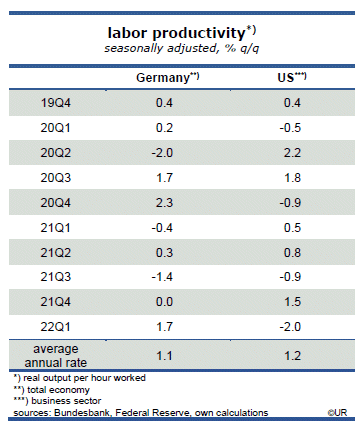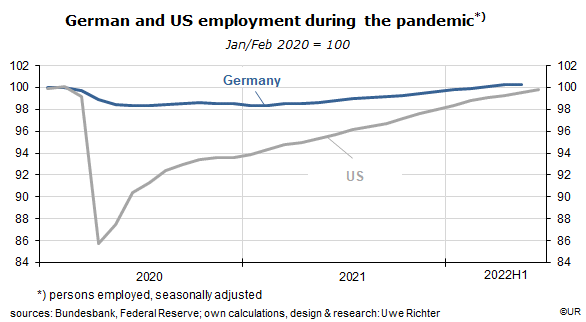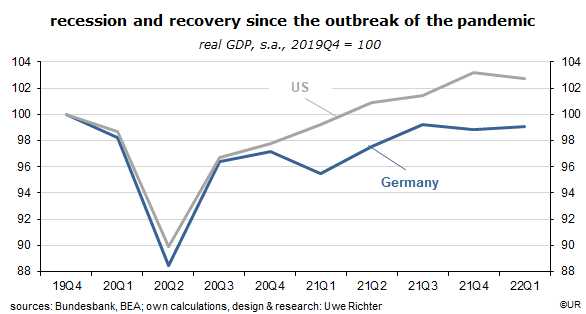
Market Commentary: Productivity growth continues to slow
Dieter Wermuth, Economist and Partner at Wermuth Asset Management
Productivity growth continues to slow, but this is actually not a big deal, more like a return to normal. The golden years of post-war economic growth, the trente glorieuses for the French, ended on October 16, 1973 when OPEC announced its first oil embargo – and will never be repeated again, says Nothwestern University’s productivity guru Robert Gordon. Between 1950 and that date in 1973, average American annual real GDP per capita growth was 2.7%, and in Germany an otherworldly 5.0%. If Gordon is right, economic dynamism has largely disappeared and is unlikely to come back: in the 48 years since 1973, America’s real GDP per capita growth has slowed to 1.7%, Germany’s to 1.5%. The trend is clearly down.
Since the fourth quarter 2019, the period immediately before the Corona crisis, labor productivity has increased at annualized rates of just 1.2 and 1.1%.

Remarkably, it had not been an advantage for America that its labor market is extremely flexible, characterized by hire and fire. In Germany, the emphasis is on stable employment conditions and the preservation of human capital across business cycles. In terms of labor productivity growth there is almost no difference between the two countries.

So why has German GDP growth been so much slower than America’s during the pandemic? The main explanation is differences in working hours: while German firms had more or less kept their staff, they significantly reduced per-capita working hours. This had a major negative impact on macro demand and thus on growth. For American firms, by contrast, the main adjustment variable were jobs, not hours worked.

Weaker productivity trends in recent decades have actually been less dramatic than it seems at first sight. As the two Nobel prize winners Banerjee and Duflo report on page 152 of their book “Good Economics for Hard Times”, Western real per-capita GDP growth had been just 0.14% per year between 1500 and 1820. Over the course of the following industrial revolution, and through 1900, GDP growth accelerated to an average of 1.24%, and to 2.00% since. In other words, today’s slow productivity growth is basically a return to the old normal, and not a big surprise.
As Gordon argues, there have been no innovations in recent decades nearly as groundbreaking as the introduction of electricity and the internal combustion engine in the 19th century. Facebook, computer games, artificial intelligence, GPS or 3d-printing? No match! Gordon actually thinks that the impact of the internet on growth has been negative – people waste too much time doing useless things. They may gain in terms of personal happiness, but since they don’t pay for social media, their happiness does not enter GDP calculations. It may sound cynical, but so far no one has developed an alternative to GDP as a measure of a population’s wellbeing.
For economists, one of the biggest challenges remains how productivity growth and thus the standard of living can be accelerated. It is undisputed that larger inputs of labor and capital will account for less than half total factor productivity growth. It clearly helps to save and invest, and to work more, but the rest will be determined by “soft” factors such as the professional qualification of the population, the openness vis-á-vis immigrants, the way production is organized (as little waste as possible), the access to cheap commodities and energy, intensive competition, including on foreign markets, or the stability of society and a fair distribution of wealth and income. It is a long list. An inevitable convergence of poor countries with richer ones is not a given, but Japan, South Korea, Taiwan, Singapore and, until recently, China have shown that it can be done.
###
For more information please contact:
Instinctif Partners
Lars Hofer
E lars.hofer@instinctif.com
T +49 162 562 8917
Visit us: https://wermutham.com/
Follow us on Twitter and LinkedIn
About Wermuth Asset Management
Wermuth Asset Management (WAM) is a Family Office which also acts as a BAFIN-regulated investment consultant.
The company specializes in climate impact investments across all asset classes, with a focus on EU “exponential organizations” as defined by Singularity University, i.e., companies which solve a major problem of humanity profitably and can grow exponentially. Through private equity, listed assets, infrastructure and real assets, the company invests through its own funds and third-party funds. WAM adheres to the UN Principles of Responsible Investing (UNPRI) and UN Compact and is a member of the Institutional Investor Group on Climate Change (IIGCC), the Global Impact Investing Network (GIIN) and the Divest-Invest Movement.
Jochen Wermuth founded WAM in 1999. He is a German climate impact investor who served on the steering committee of “Europeans for Divest Invest”. As of June 2017, he was also a member of the investment strategy committee for the EUR 24 billion German Sovereign Wealth Fund (KENFO).
Legal Disclaimer
The information contained in this document is for informational purposes only and does not constitute investment advice. The opinions and valuations contained in this document are subject to change and reflect the viewpoint of Wermuth Asset Management in the current economic environment. No liability is assumed for the accuracy and completeness of the information. Past performance is not a reliable indication of current or future developments. The financial instruments mentioned are for illustrative purposes only and should not be construed as a direct offer or investment recommendation or advice. The securities listed have been selected from the universe of securities covered by the portfolio managers to assist the reader in better understanding the issues presented and do not necessarily form part of any portfolio or constitute recommendations by the portfolio managers. There is no guarantee that forecasts will occur.
Read the full article in PDF format here: English.